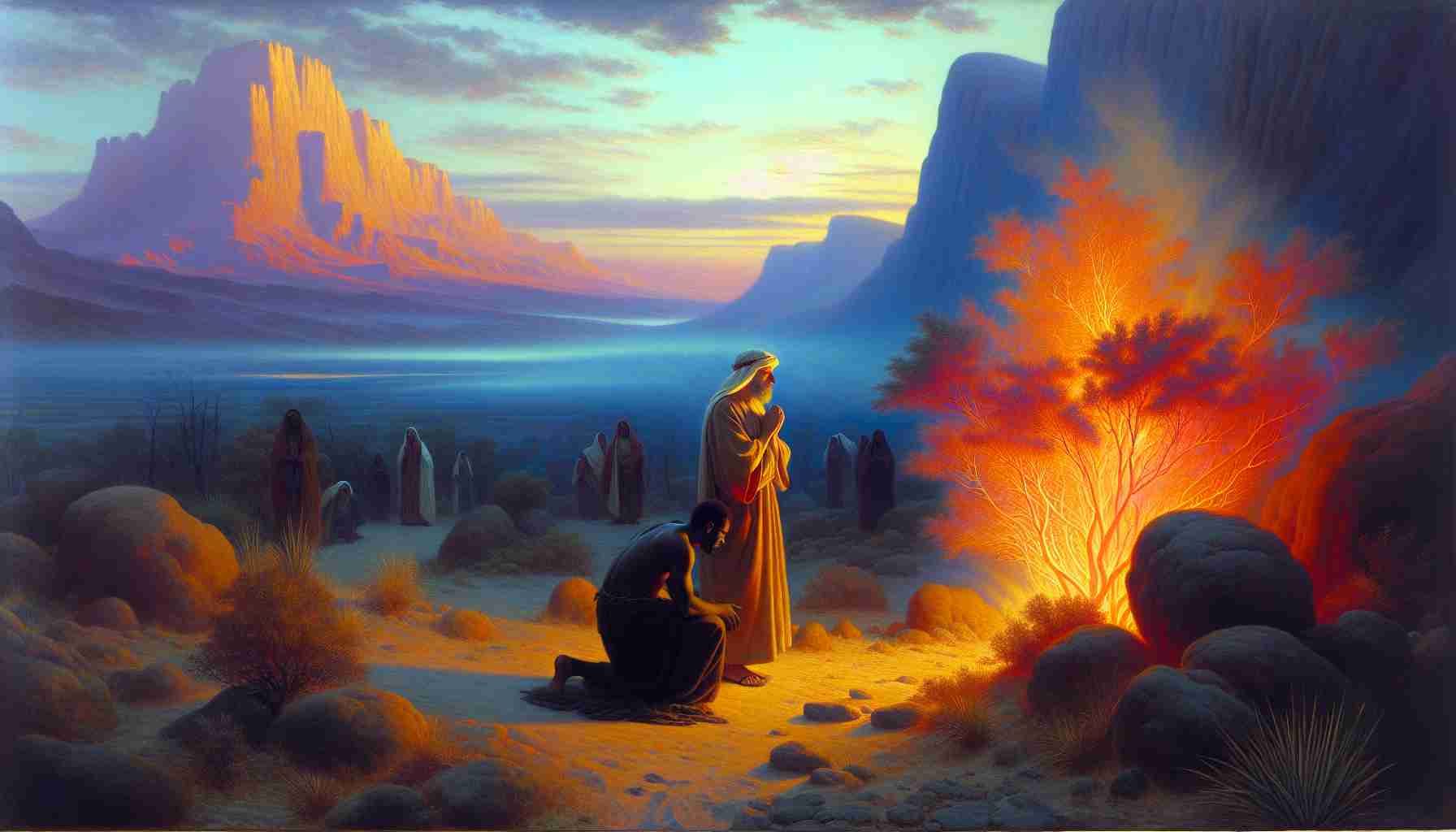

I was feeding the goats near the foot of Mount Horeb when I saw it—flames dancing in a thornbush, yet the branches didn’t burn. My name won’t appear in any scroll, but that day, I stood barely twenty paces from the moment Moses was called by God.
I was a shepherd from Midian, just a servant tending flocks for Jethro, Moses’ father-in-law. To me, Moses was quiet, a man with a heavy past. He didn’t talk much of Egypt, but his eyes sometimes carried the weight of it—like he had once been someone important, and now didn’t know who he was.
That morning, I watched him leave the camp with a stick and a tired look, like every step he took away from us gave him a little relief. He moved with purpose even when there was none.
A while later, I saw him freeze, his eyes fixed on something. Then he turned aside and walked slowly toward it. I squinted to see what had caught his attention, and that’s when I noticed the bush—a fire that didn’t consume.
I stepped closer, staying behind the rocks. Then I heard a voice. Not loud, but strong. Deeper than thunder, yet still. It called, “Moses, Moses.”
He answered, “Here I am.”
I couldn’t hear all the words that followed, but I saw Moses remove his sandals. He knelt, trembling, hands over his face. Whatever he heard, it shook him. I later heard him mention the words: “Take off your sandals… you are standing on holy ground.”
He stayed there for some time. The sun climbed, and the goats wandered, but I couldn’t stop watching. It’s strange—seeing someone meet holiness. You feel small but alive, like the world has stretched wider than you thought possible.
When he returned, everything was different. His eyes burned brighter than the bush had. He didn’t say much at first. Just, “God has seen His people’s suffering in Egypt. He’s sending me back.”
Back to Egypt? To the Egyptians who had once wanted him dead? To the Israelites who might not even remember him?
He must have seen my fear, because he added, “I asked Him, ‘Who am I that I should go?’ And He answered, ‘I will be with you.’”
That’s what stayed with me.
It wasn’t the fire or the voice—even though those things shook me to my bones. It was Moses’ change. He’d thought he was no one. A runaway prince in the desert. But God didn’t need titles. He needed a heart willing to go where He sent.
And Moses, though afraid, said yes.
I watched him walk away from the mountain with shoulders lifted and steps steadier. The fire that called him might have stayed in that bush, but some of it had entered his spirit.
I tended goats that day.
He walked into history.
And I learned that sometimes, all God needs is someone to turn aside—and listen.
I was feeding the goats near the foot of Mount Horeb when I saw it—flames dancing in a thornbush, yet the branches didn’t burn. My name won’t appear in any scroll, but that day, I stood barely twenty paces from the moment Moses was called by God.
I was a shepherd from Midian, just a servant tending flocks for Jethro, Moses’ father-in-law. To me, Moses was quiet, a man with a heavy past. He didn’t talk much of Egypt, but his eyes sometimes carried the weight of it—like he had once been someone important, and now didn’t know who he was.
That morning, I watched him leave the camp with a stick and a tired look, like every step he took away from us gave him a little relief. He moved with purpose even when there was none.
A while later, I saw him freeze, his eyes fixed on something. Then he turned aside and walked slowly toward it. I squinted to see what had caught his attention, and that’s when I noticed the bush—a fire that didn’t consume.
I stepped closer, staying behind the rocks. Then I heard a voice. Not loud, but strong. Deeper than thunder, yet still. It called, “Moses, Moses.”
He answered, “Here I am.”
I couldn’t hear all the words that followed, but I saw Moses remove his sandals. He knelt, trembling, hands over his face. Whatever he heard, it shook him. I later heard him mention the words: “Take off your sandals… you are standing on holy ground.”
He stayed there for some time. The sun climbed, and the goats wandered, but I couldn’t stop watching. It’s strange—seeing someone meet holiness. You feel small but alive, like the world has stretched wider than you thought possible.
When he returned, everything was different. His eyes burned brighter than the bush had. He didn’t say much at first. Just, “God has seen His people’s suffering in Egypt. He’s sending me back.”
Back to Egypt? To the Egyptians who had once wanted him dead? To the Israelites who might not even remember him?
He must have seen my fear, because he added, “I asked Him, ‘Who am I that I should go?’ And He answered, ‘I will be with you.’”
That’s what stayed with me.
It wasn’t the fire or the voice—even though those things shook me to my bones. It was Moses’ change. He’d thought he was no one. A runaway prince in the desert. But God didn’t need titles. He needed a heart willing to go where He sent.
And Moses, though afraid, said yes.
I watched him walk away from the mountain with shoulders lifted and steps steadier. The fire that called him might have stayed in that bush, but some of it had entered his spirit.
I tended goats that day.
He walked into history.
And I learned that sometimes, all God needs is someone to turn aside—and listen.